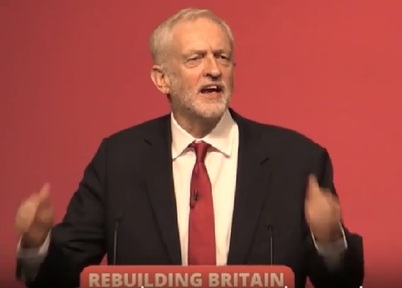Place your bets: Social care green paper or general election?
Which one will come first? The public was promised a blueprint for social care by Theresa May this Autumn but some in the care sector may wonder if their hopes for the delivery of a green paper will be dashed once more, as Labour leader Jeremy Corbyn calls for a general election.

In his one-hour-long speech at Liverpool’s Labour Party conference, Jeremy Corbyn courted the older generation, promising if he were Prime Minister he would keep the triple lock on pensions and set up a national health and care service.
'Hostile environment for disabled people'
He said: “We owe it you, the older generation, to rebuild Britain so you too have peace of mind and dignity. And we will fulfill that obligation with the triple lock on pensions protected along with the winter fuel allowance, a free bus pass and a national health and care service that can look after you and your families with respect. That is solidarity between the generations.”
The Labour leader told the conference audience: “The Tories have created a hostile environment for disabled people. Hundreds of people from all over the country write to me about it every week.”
'Oh...Jeremy Corbyn'
And when it comes to the final vote in Parliament on a Brexit deal, he warned: “As it stands, Labour will vote against the Chequers plan or whatever is left of it and oppose leaving the EU with no deal. If Parliament votes down a Tory deal or the government fails to reach any deal at all, we would press for a general election.” His speech led the audience to break out into song with the familiar chant 'Oh...Jeremy Corbyn'.

But as Mr Corbyn demands a general election, those working in social care and millions of older people who rely on it are in limbo; wanting to know if we are nearly there yet with the arrival of the long-awaited social care green paper.
Health secretary Matt Hancock recently said he is keen for the green paper to include an ‘opt-out’ insurance scheme for care costs. This would see workers automatically enrolled and protected against future care costs. People could opt out but, if they did, they would need to cover their future social care costs themselves.
'Does not inspire confidence'
Simon Bottery, senior fellow at King’s Fund, the health and care think tank, said: “The idea of an opt-out is a classic nudge approach and its nearest model is pension auto-enrolment.”
But he says this untried concept and its “late arrival to the debate does not inspire confidence in the process for developing the green paper so far”.
Mr Bottery argues unlike pension saving, there is “little to suggest many people see the need to insure themselves against social care costs”. He says government encouragement did not entice insurers during the run-up to the planned introduction of the social care cap in 2016 "and they show no interest in returning now".
As well as highlighting the merits of Japan’s compulsory insurance scheme which had no opt-out, he says “the green paper should really examine all viable options including other successful approaches, such as tax-funded free personal care in Scotland. Otherwise it risks being, in reality, a red herring and a missed opportunity.”
And if anyone is wondering about the state of social care, Skills for Care recently published its report: 'The state of the adult social care sector and workforce in England', which reveals a quarter of the care workforce were on a zero-hours contract (335,000 jobs) and eight per cent of the adult social care workforce (104,000 jobs) are non-British EU workers.
As the care sector waits for a clue as to what the government’s plan is for social care and when it will arrive, the Health and Social Care Select Committee is seeking views now on the impact of a ‘no deal’ Brexit on social care and is holding an evidence session in October on the issue.
The Committee is inviting views from the care sector and wants to know what the impact of a no-deal Brexit is likely to be on the health and social care system and the risks to those reliant on care.
The Committee particularly is keen to hear about the extent of the risks to care of disruption to the supply from the EU-27 to the UK of medicines, medical devices and how effectively care providers are planning for a no-deal Brexit.
The deadline for submissions to the Committee is 15 October - and it is one date care providers can with some certainty scribble in their diaries. As for answers from the Government on social care and whether the green paper will materialise before a general election - that's anybody's guess.
Latest News Analysis
 04-Sep-19
Extra £1.5 billion announced for social care in Chancellor's Spending Review
04-Sep-19
Extra £1.5 billion announced for social care in Chancellor's Spending Review
 02-Jul-19
Department of Health forced to rethink care homes' nursing rates after legal challenge
02-Jul-19
Department of Health forced to rethink care homes' nursing rates after legal challenge
 18-Jun-19
Overnight care workers forced to sleep in offices and told 'bring your own bedding'
18-Jun-19
Overnight care workers forced to sleep in offices and told 'bring your own bedding'
 14-Jun-19
Back in the closet: Third of care home staff have had no LGBT+ awareness training
14-Jun-19
Back in the closet: Third of care home staff have had no LGBT+ awareness training
 11-Jun-19
PM candidates on social care: Rory Stewart calls fixing care an 'unfinished revolution'
11-Jun-19
PM candidates on social care: Rory Stewart calls fixing care an 'unfinished revolution'